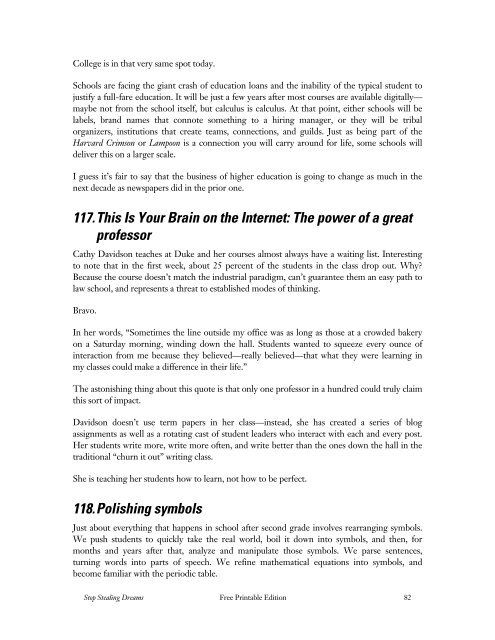1DO0vxU
1DO0vxU
1DO0vxU
You also want an ePaper? Increase the reach of your titles
YUMPU automatically turns print PDFs into web optimized ePapers that Google loves.
College is in that very same spot today.<br />
Schools are facing the giant crash of education loans and the inability of the typical student to<br />
justify a full-fare education. It will be just a few years after most courses are available digitally—<br />
maybe not from the school itself, but calculus is calculus. At that point, either schools will be<br />
labels, brand names that connote something to a hiring manager, or they will be tribal<br />
organizers, institutions that create teams, connections, and guilds. Just as being part of the<br />
Harvard Crimson or Lampoon is a connection you will carry around for life, some schools will<br />
deliver this on a larger scale.<br />
I guess it’s fair to say that the business of higher education is going to change as much in the<br />
next decade as newspapers did in the prior one.<br />
117.This Is Your Brain on the Internet: The power of a great<br />
professor<br />
Cathy Davidson teaches at Duke and her courses almost always have a waiting list. Interesting<br />
to note that in the first week, about 25 percent of the students in the class drop out. Why?<br />
Because the course doesn’t match the industrial paradigm, can’t guarantee them an easy path to<br />
law school, and represents a threat to established modes of thinking.<br />
Bravo.<br />
In her words, “Sometimes the line outside my office was as long as those at a crowded bakery<br />
on a Saturday morning, winding down the hall. Students wanted to squeeze every ounce of<br />
interaction from me because they believed—really believed—that what they were learning in<br />
my classes could make a difference in their life.”<br />
The astonishing thing about this quote is that only one professor in a hundred could truly claim<br />
this sort of impact.<br />
Davidson doesn’t use term papers in her class—instead, she has created a series of blog<br />
assignments as well as a rotating cast of student leaders who interact with each and every post.<br />
Her students write more, write more often, and write better than the ones down the hall in the<br />
traditional “churn it out” writing class.<br />
She is teaching her students how to learn, not how to be perfect.<br />
118.Polishing symbols<br />
Just about everything that happens in school after second grade involves rearranging symbols.<br />
We push students to quickly take the real world, boil it down into symbols, and then, for<br />
months and years after that, analyze and manipulate those symbols. We parse sentences,<br />
turning words into parts of speech. We refine mathematical equations into symbols, and<br />
become familiar with the periodic table.<br />
Stop Stealing Dreams Free Printable Edition 82


